A meticulously designed survey was conducted to delve into the political sentiments and institutional preferences among the Pakistani populace. Comprising 14 incisive multiple-choice questions, the survey yields rich insights into various facets of the political spectrum, including governance preferences, leadership popularity, and the perception of key institutions. The following are the significant takeaways from this endeavor:
- Governance Preference Spectrum:
- 82.5% of respondents expressed a strong inclination towards a democratic system, embodying the entrenched democratic values among the populace.
- In stark contrast, a negligible 1% showed a preference for military rule, whilst 15.5% endorsed neither, indicating a possibility of advocacy for alternative governance paradigms.
- Political Party Affiliation:
- A dominant 98.7% identified Pakistan Tehreek-e-Insaf (PTI) as the most popular political party, reflecting a substantial endorsement of PTI’s ideology and leadership.
- Military’s Political Involvement:
- 94.5% rebuffed any military role in the political domain, underscoring a clear consensus on keeping the military and politics distinct.
- A mere 1.2% advocated for a higher degree of military involvement, with 2.6% and 1.5% vouching for very little or somewhat of a role, respectively.
- May 9 Narrative Dissection:
- A whopping 98.8% negated the allegation against Imran Khan concerning an attempt to overthrow the military on May 9, dismissing it as a fabricated narrative.
- Leadership Popularity Matrix:
- Imran Khan stood out as a political stalwart with 98.6% acclaiming him as the most popular leader, highlighting a robust trust and endorsement in his leadership.
- Institutional Preference Analysis:
- When questioned about institutional preferences, 73.9% opted for none of the listed institutions (Army, Police, Judiciary, Parliament, Media, Election Commission), indicating a substantial disillusionment with these entities.
- 16.8% expressed a preference for the Parliament, while 5.6% favored the Army, underscoring a relative trust in these institutions.
- Army Affection Post Regime Change:
- A profound shift in public affection for the army was unveiled post-regime change, with 92.4% stating that their love for the army had diminished post-change. On the contrary, only 2.5% maintained a consistent level of affection.
This systematic survey unveils a significant endorsement for democratic governance, the remarkable popularity of PTI and its leader, Imran Khan, alongside a striking disillusionment with key institutions, notably post-regime change. These findings furnish a robust foundation for a nuanced understanding and discourse concerning the prevailing political and institutional sentiments in Pakistan, thereby aiding informed decision-making and policy formulation.
سوال نمبر 1: کیا ملک کیلئے جمہوری نظام بہتر ہے یا فوج کی حکومت آپکی کیا رائے ہے؟

سوال نمبر 2: آپ کے خیال میں پاکستانی فوج کا ملکی سیاست میں کتنا کردار ہونا چاہیئے

سوال نمبر 3:درج ذیل اداروں میں سے آپ کس کو پسند کرتے ہیں؟

سوال نمبر 4: جتنا پیار فوج سے رجیم چینج سے پہلے کرتے تھے کیا آج بھی اتنا ہی پیار کرتے ہیں؟

سوال نمبر 5: کیا 9 مئی سے پہلے فوج کو زیادہ سپورٹ کرتے تھے یا 9 مئی کے بعد زیادہ سپورٹ کرتے ہیں؟

سوال نمبر 6: کیا 9 مئی سے پہلے فوج پہ زیادہ اعتبار کرتے تھے یا 9 مئی کے بعد اعتماد میں اضافہ ہوا؟

سوال نمبر 7: کیا 9 مئی جلاؤ گھیراؤ کا ذمہ دار عمران خان ہے؟
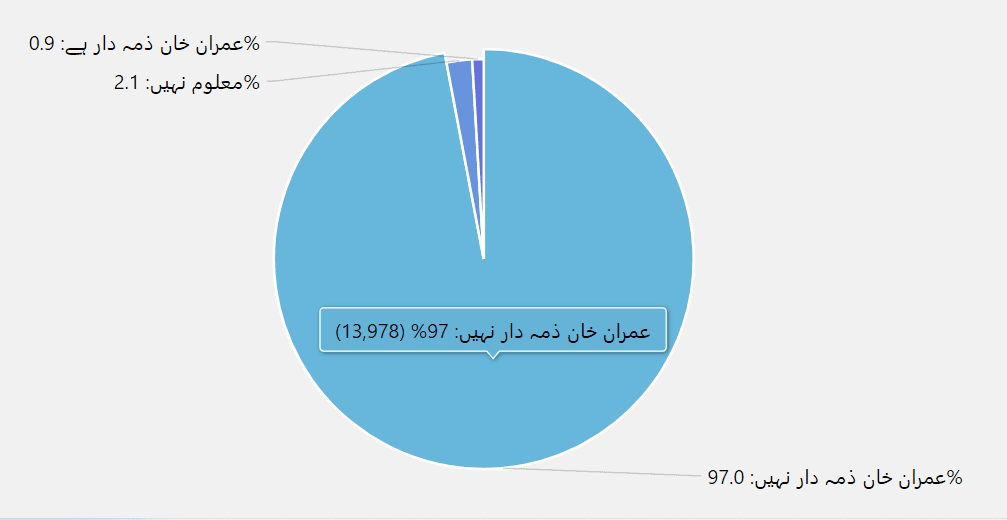
سوال نمبر 8: کیا آپ 9 مئی سے پہلے عمران خان کو زیادہ سپورٹ کرتے تھے یا 9 مئی کے بعد زیادہ کرتے ہیں؟

سوال نمبر 9: کیا 9 مئی تحریک انصاف اور عمران خان کیخلاف سازش تھی؟
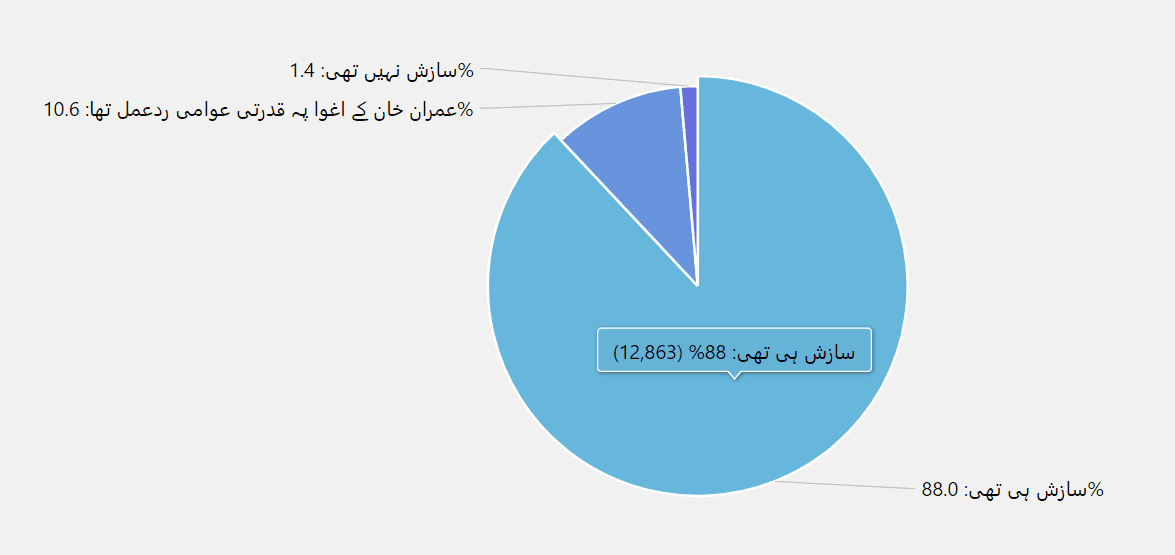
سوال نمبر 10: کیا عمران خان نے 9 مئی کو فوج کا تختہ الٹنے کی کوشش کی؟
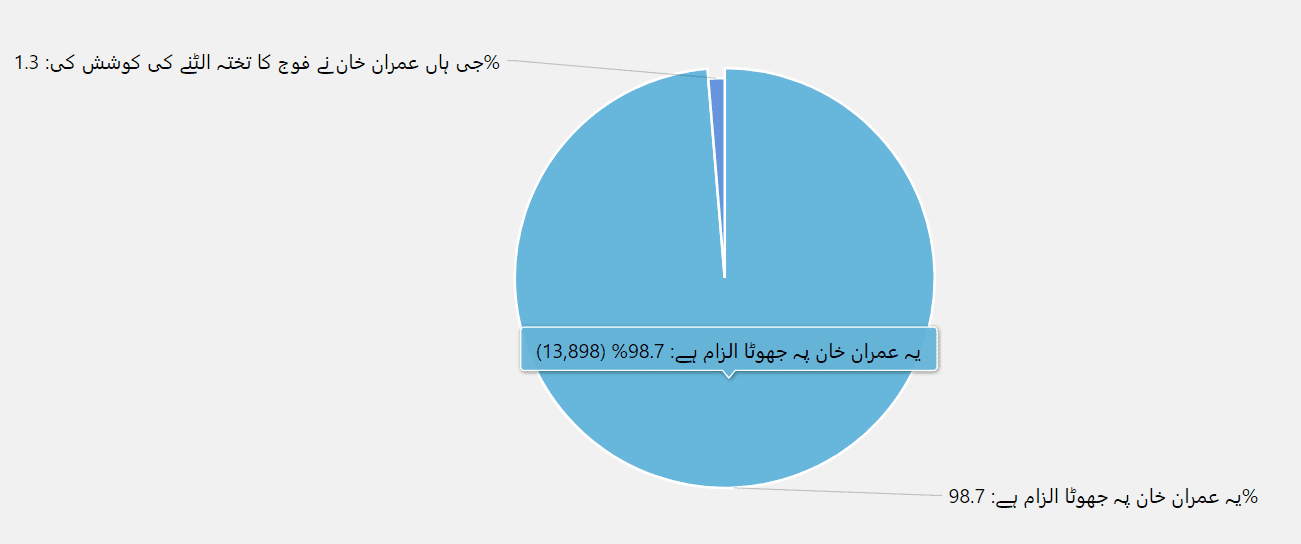
سوال نمبر 11: کیا عمران خان کی حکومت آئینی طریقے سے گرائی گئی یا امریکی مداخلت کی وجہ سے؟
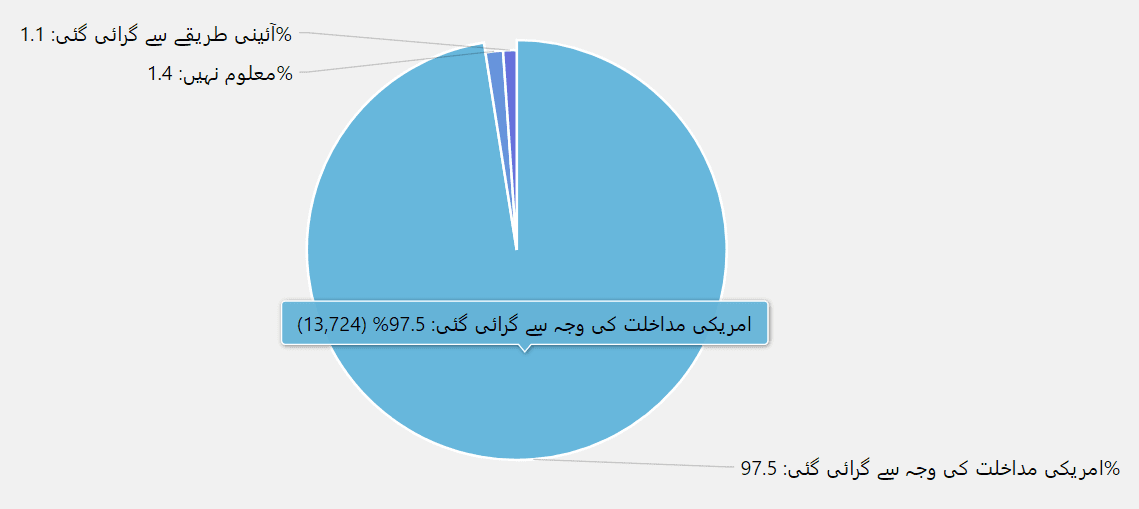
سوال نمبر 12: آپ پاکستان کی تمام افواج میں سے کس پہ زیادہ اعتماد کرتے ہیں
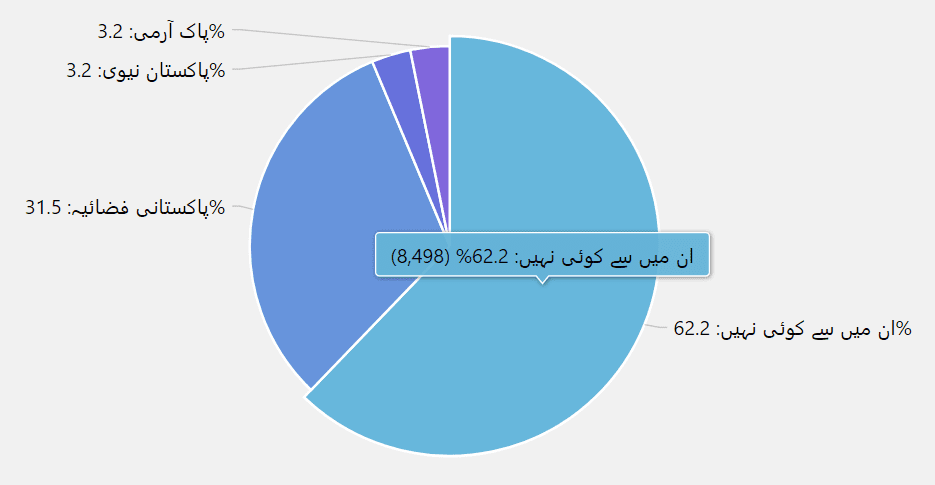
سوال نمبر 13: پاکستان کا سب سے مقبول لیڈر کون ہے
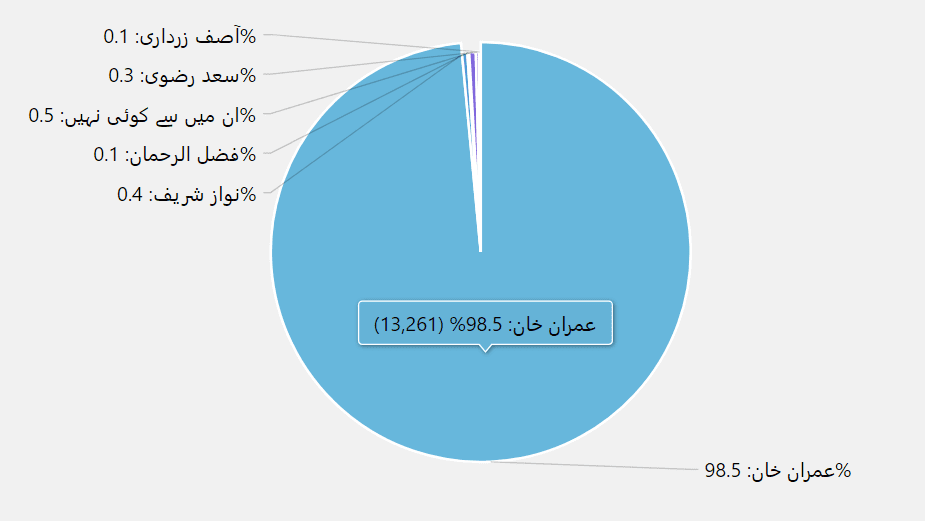
سوال نمبر 14: پاکستان کی سب سے مقبول سیاسی جماعت کونسی ہے
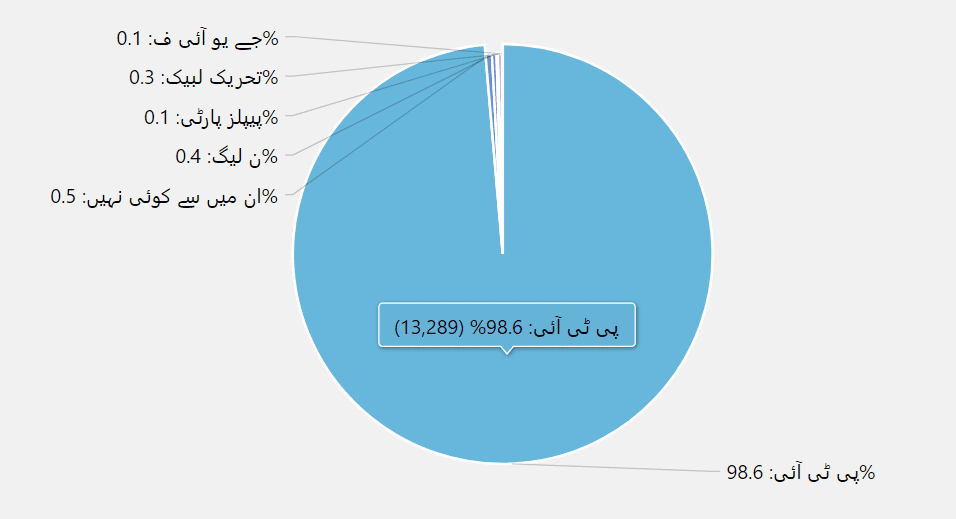
Here is the list of the rest of the cities where people voted from.
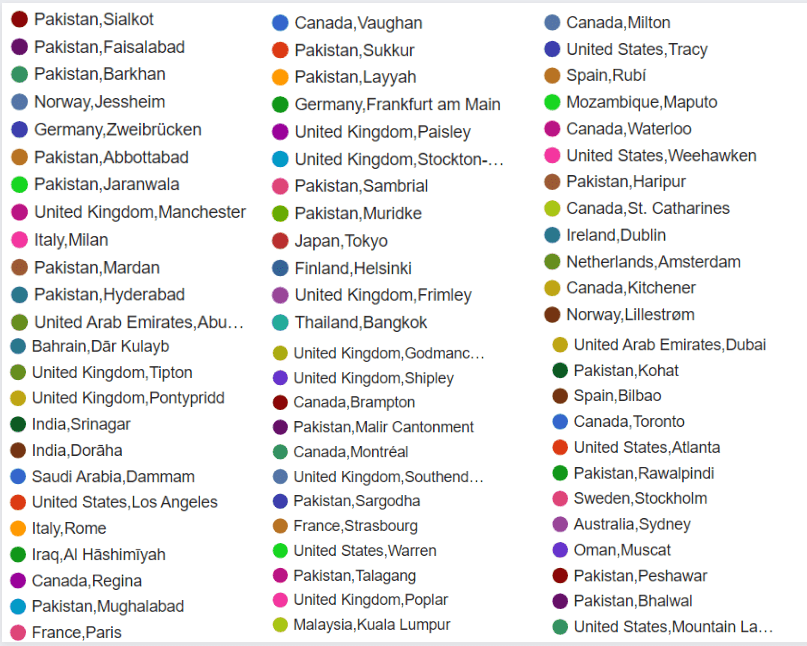
In our comprehensive assessment, the geographical distribution of responses played a pivotal role in understanding the diverse viewpoints from various cities of the country. Here’s a detailed breakdown:
- Islamabad, the capital city, emerged as the epicenter of the responses, recording the highest number of votes for each question. This underlines the proactive engagement of the capital’s populace in shaping the national discourse.
- Lahore trailed closely, securing its position as the second most vocal city, reflecting the historical significance and political activity of the Punjab’s capital.
- Karachi, though in the third position, was not far behind. The slight margin demonstrates the city’s enthusiastic participation, mirroring its position as a key political and economic hub.
- Peshawar, with its unique blend of culture and politics, marked its presence by ranking fourth, showcasing the city’s active engagement and stake in national matters.
Conclusion:
The expansive reach of this survey is noteworthy, capturing responses not just from major urban centers, but also reflecting the sentiments of the federal capital and all four provinces of Pakistan. Such broad-based participation elevates the significance of this survey, reinforcing its credibility and representativeness. The substantial involvement from Islamabad, the federal capital, coupled with substantial contributions from cities across all provinces, provides an unequivocal testament to the inclusivity of this endeavor. Thus, it can be confidently asserted that the insights derived from this survey are a true mirror to the sentiments, aspirations, and opinions of the nation at large, offering a comprehensive panorama of the country’s political and institutional landscape.
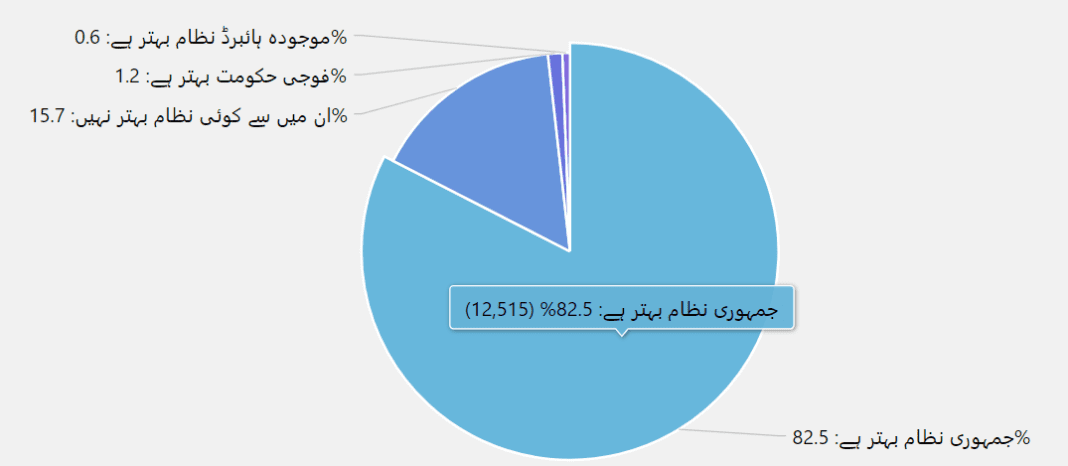
I love imran Khan.
They have to release him.
Bhai Maine Gujranwala SE kia tha mere city ka Naam nahi aaiy
Madam, mere khayal me votes to taqreeban pooray pakistan se aye hain magar jaha se zyada votes aye hain un ka nam liya hai,
Bhai mere city ka Naam nahi aaiy
Gujranwala
Total number of votes not mentioned
Love Imran khan 💕💖💕💕🌹
Good efforts and good results to open wide eyes
#RELEASE IMRAN KHAN GIVE HIM JUSTICE#FREE IMRAN KHAN#
Ik no 1
Army take illegal action on him
Imran Khan not guilty in 9 may incident
WEST power+Asim, establishment+PDM+media+judiciary+all IG, governor.. vs only one person KHAN. this is historical